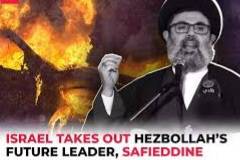Middle East Crisis: Hezbollah Confirms Death of Prospective Leader Hashem Safieddine in Israeli Attack
The Middle East continues to grapple with escalating tensions as Hezbollah, the Lebanese militant group, has confirmed the death of Hashem Safieddine, a key figure and prospective leader within the organization. His death, resulting from an Israeli airstrike, marks a significant moment in the ongoing conflict and underscores the volatile nature of the region.
Background on Hashem Safieddine
Hashem Safieddine was widely recognized within Hezbollah circles as a potential successor to the current leader, Hassan Nasrallah. Known for his strategic acumen and close ties to Iran, Safieddine played a crucial role in shaping Hezbollah's military and political strategies over the years. His influence extended beyond Lebanon, positioning him as a critical figure in the broader Iranian-led axis of resistance against Israel and its allies.
The confirmation of his death comes at a time of heightened tensions in the region, particularly following the recent conflict between Israel and Hamas. This escalation has not only impacted Gaza but has also involved various regional actors, including Hezbollah, which has increasingly been drawn into the fray.
The Attack and Its Implications
The Israeli airstrike that claimed Safieddine's life reportedly targeted a convoy in southern Lebanon, an area that has seen an uptick in military activity following the renewed conflict. Israel has stated that its operations are aimed at preventing attacks from Hezbollah and other militant groups that threaten its security. However, the assassination of a prominent leader like Safieddine raises questions about Israel's strategy and the potential for further retaliation from Hezbollah.
Hezbollah has historically responded to the deaths of its leaders with significant military action. The group has vowed to retaliate against Israeli aggression, which could lead to an escalation of conflict across the region. This cycle of violence is particularly concerning given the already fragile state of affairs in Lebanon, where economic hardships and political instability have left the population vulnerable.
Regional Reactions
The death of Safieddine has sparked reactions across the Middle East. Iranian officials have condemned the Israeli strike, framing it as an act of aggression that threatens regional stability. Iran’s support for Hezbollah is well-documented, and it is likely that Tehran will respond in some form, either through direct support for Hezbollah or by increasing military aid to bolster the group’s capabilities.
Additionally, the Palestinian factions in Gaza have expressed solidarity with Hezbollah, emphasizing the need for a united front against Israel. The intertwined fates of these groups highlight the complexities of the regional conflict, where the actions of one player can have cascading effects on others.
The Broader Context
Safieddine’s death cannot be viewed in isolation. It is part of a larger pattern of conflict in the Middle East, characterized by proxy battles, sectarian divisions, and geopolitical maneuvering. The ongoing Israeli-Palestinian conflict, exacerbated by the recent surge in violence, has drawn in various actors, complicating efforts for peace.
The United States and other Western nations have called for restraint from both Israel and Hezbollah, urging diplomatic solutions to prevent a broader conflict. However, the entrenched positions of both sides make such resolutions challenging. Israel’s security concerns often clash with the rights and aspirations of Palestinian groups, while Hezbollah’s commitment to resistance remains steadfast.
Conclusion
The death of Hashem Safieddine marks a pivotal moment in the ongoing crisis in the Middle East, highlighting the fragility of the region’s political landscape. As Hezbollah prepares for potential retaliation and regional actors reassess their strategies, the situation remains tense. The international community watches closely, hoping for de-escalation but recognizing the deep-rooted issues that continue to fuel conflict in this tumultuous region. The coming days will be critical in determining whether the loss of Safieddine will lead to further violence or if it will prompt new avenues for dialogue and peace.


